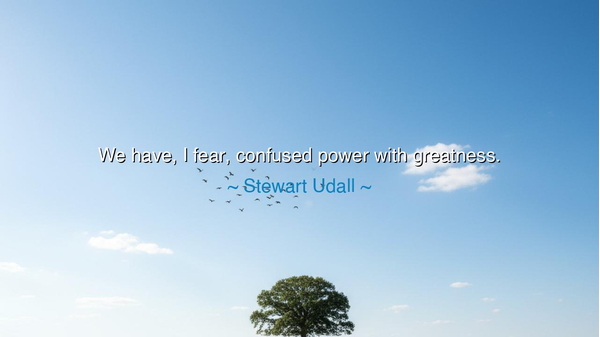
We have, I fear, confused power with greatness.






The words of Stewart Udall, “We have, I fear, confused power with greatness,” are a lament and a warning. They speak to the age-old error of mankind: the belief that might alone is noble, that to command armies or wealth is the same as to embody wisdom or virtue. Yet history whispers otherwise. Power can seize, but it cannot inspire. Power can destroy, but it cannot create meaning. Only greatness, born of justice, humility, and service, leaves a legacy that endures beyond the grave.
In the halls of empires, rulers have often clothed themselves in the illusion of greatness merely because they wielded the sword or the scepter. Yet their monuments crumble, their conquests fade, and their names are remembered with fear rather than reverence. For true greatness is not measured by dominion over others, but by the light one brings to them. To mistake power for greatness is to build a palace on shifting sands, destined to collapse when the storms of time arrive.
Consider the tale of Marcus Aurelius, emperor of Rome. Though he held the mightiest throne of his era, he did not rest his identity upon power alone. Instead, he sought wisdom, writing the Meditations as a guide for the soul. In those pages, he reminded himself that the emperor’s robes were but a garment, that what endures is not conquest but character. He is remembered not only as a ruler, but as a philosopher-king—because he chose the path of greatness rather than the hollow glitter of power.
Contrast him with others: tyrants who bathed their reigns in blood, imagining themselves immortal through fear. Their rule ended in ruin, their names cursed, their legacies shadows. They mistook power for greatness, and so, when their armies fell silent, nothing of them remained but dust and warning. This is the confusion that Udall warns against—the temptation to see domination as honor, and force as virtue.
Therefore, O children of tomorrow, remember this truth: Power is fleeting, but greatness is eternal. To be powerful is to hold sway for a season; to be great is to plant seeds that blossom for generations. Seek not the throne that towers above men, but the heart that lifts them. For when the ages pass, the world does not ask who ruled the strongest—it asks who lived the noblest.






TNVu Thi Ninh
This quote is a powerful reminder that power doesn’t necessarily equate to greatness. In many cases, those who hold the most power are not always the ones making the most positive impact. I wonder, how can we as a society begin to value the qualities of greatness—such as empathy, wisdom, and kindness—over power? Is it possible for individuals with power to also embody true greatness, or are they inherently at odds with one another?
VATrinh Van Anh
Stewart Udall's quote really makes me question how we measure success and influence in our society. Power is something people can gain by force or manipulation, but greatness comes from the ability to inspire and improve the world around us. How do we start distinguishing between these two in a world where so many are drawn to those who hold power, regardless of how they obtained it? Shouldn't greatness be the true measure of influence?
TPBui Thanh Phuc
I think this quote highlights a serious issue in how we view leadership and influence. Power can often come from manipulation or dominance, while greatness is rooted in humility, vision, and positive change. I wonder, how can we begin to shift our focus from valuing power to recognizing the qualities that define greatness? Can we build a society where greatness, rather than just power, is what we aspire to in our leaders?
NHHo Ngoc Han
This quote makes me reflect on how often we confuse power with true greatness. Power is often seen in the ability to control or influence others, while greatness is about making a positive impact that resonates beyond authority. But do we always recognize the difference? It’s easy to fall into the trap of idolizing people with power, but how often do we consider the deeper qualities of greatness, like compassion or integrity?